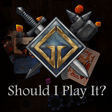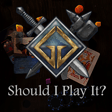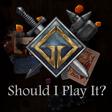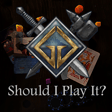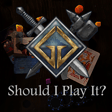Become a Creator today!Start creating today - Share your story with the world!
Start for free
00:00:00
00:00:01

Raising Robots with Seth Van Orden
Not all deep or 'chunky' games take forever to play. That's one of the appeals of Raising Robots by Nauvoo Games, including its fun, vibrant art and thoughtful design. Put on your lab coat and find your tools - it's time to invent your robot!
Visit the Nauvoo Games website for more info.
Recommended
Transcript
What Makes a Game Fun?
00:00:00
Speaker
It shouldn't come as any surprise that game designers very often create games that fit their idea for what makes a fun game experience. What's amazing is just how many variables there are in that equation. Is the game short or long? Do players start out on an even playing field or is it asymmetrical? Is it casual or strategic? Is the focus building yourself up or tearing your opponents down? Is it cooperative or competitive? How many players do you need to play it?
00:00:26
Speaker
The true diversity of gaming experiences lies in the fact that none of those variables is really exclusive of the others. You can have a casual fun game that takes hours to play, or you can have a deep strategic game that you can complete several times in an evening.
Discover Games with Creators
00:00:40
Speaker
We hope this podcast helps you find some of the games that you're looking for with answers straight from the creators themselves. Enjoy this episode of Should I Play It?
Interview with Seth Van Orden
00:00:55
Speaker
All right, everybody, welcome back to another episode of Should I Play It? And I am delighted to have Seth Van Orden of Nauvoo Games as my guest. And Nauvoo is the creator of many games, actually, as I was scrolling through this. But most recently, the very colorful, very beautiful technological, I would say, in some ways, game-raising robots. Seth, thanks for joining me today. Thank you for having me.
00:01:21
Speaker
Absolutely. So before we get into the game itself, and you can kind of talk a little bit about it, you know, kind of take us through the story of Nauvoo games, you and your partner, I saw created it in, or kind of met in high school, right? Yeah, yes, we were friends way back in the day, we did things like D&D and video games and board games together growing up.
00:01:41
Speaker
But we reconnected later in college, we had played a lot of video games in particular, some tower defenses, we used to play a lot of Warcraft back in the day anyway, so we played some video games that we wanted to make in a board game, so it wouldn't be fun if there was a board game that could do this.
Designing a Tower Defense Game
00:01:58
Speaker
in particular there was a tower defense type of board game that we wanted to do and we tried it out. We've never lived in the same town since we started this but we caught back up while we were in college and well I made up a mock-up and it turns out in my opinion tower defenses are awful games for board games and you have to do tons of calculations. There's so many things that work on a computer that are hard to really simulate and people have tried it and
00:02:27
Speaker
In my mind, I've tried a lot of them, and none of them have really got me in it. But anyway, so that's how we reconnected. So I started in game design on several other things, and none of them worked. But eventually, I came on the idea that we had for Stockpile. And I reached back out and said, hey, I actually have this game design that's actually working. It's actually fun. And me and Brett, Brett Sobel is the other half of Nelvoo Games.
00:02:55
Speaker
I said, he's the business side. So in particular, I'm more of the designer, but we do both each, but he's the business mind. He's got the logistics, the taxes, doing all the business side of things, publishing side. And I take care of more of the design side. And I said,
Success of Stockpile
00:03:11
Speaker
Hey, I've got this game. It's working really well. And we both invested some money with Kickstarter route. We investigated doing other apps, but we decided to self publish. And the rest is history from there, but
00:03:26
Speaker
I'd be amazed, I actually wouldn't be amazed if most games or a lot of most recent games started with, wouldn't this be cool as a board game or as a card game or something. I think it's a common theme.
Introducing Raising Robots
00:03:40
Speaker
Great, so Raising Robots is the most recent project that you guys went out, correct?
00:03:46
Speaker
We have a copy. My business partner, Mike, actually, during your Kickstarter back, said, look, we're using the same graphic designer, full disclosure, and really, really just liked it as a concept and everything. So he's like, I'm grabbing it. So it's on our shelf. I call it our company shelf at his house. So talk a little bit about how the game plays, you know, whatever you want to share about it. Yeah. So Racing Robots, despite it,
00:04:14
Speaker
Having the most juvenile art of all of our games is probably the most complex of all of our games. It's an engine-building game. The easiest way to describe it, if you're familiar with these other games, would be a crossover between Wig and Span and Race for the Galaxy.
00:04:31
Speaker
in that it has engine building, like a lot of games, more than just wingspan, but it has the three rows that you might be familiar with with light wingspan. But you're building a lot of, in this case, robots that activate when you activate certain phases, but it has a phase selection mechanism that's similar to Race of the Galaxy, Ares Expedition, or any of the simultaneous phase selection that the phases you select affects the other players. And so it has simultaneous play, but also has that interaction. So it cuts down on the
00:05:01
Speaker
the game length, but at the same time allows you to all be working at the same time to have interaction. So that's sort of the brief overview.
Game Inspirations and Improvements
00:05:11
Speaker
In general, the reason we started it, and I can tell you a little bit about the history and why you might like it, but we started at this one
00:05:21
Speaker
was when we actually first played a game called Cora in a game called Lorenzo. At one of our GenCon meetups, we were just playing a lot of the new hot games. Cora had just recently come out and had some base selection in it of picking two phases like we do in Raising Robots.
00:05:40
Speaker
But these phases were not all, or actions were not all even. You roll some dice and that tells you what phases you can pick. And the higher the roll, the better it is. You have some things to mitigate it, like the resources that you could spend, but better rolls and better rolls. And no matter how you spun it, you're either lucky or you weren't lucky. And that was one thing that frustrated us as game players. And that's where a lot of our designs come from is
00:06:06
Speaker
is what if this game was better and what if we can do what they had, but we can do it better. And so that's sort of where it started is instead of we like the fact that there's a random input that you have to deal with each turn. In this case, it was dice. The problem with it is it felt unfair because someone could have better roles. So in our case, we have a deck that gives you random inputs. But everyone goes to that deck twice.
00:06:33
Speaker
And there's still some luck. There's definitely luck. And I don't think all luck is bad luck. But you still have to deal with, oh, I wish I had two high numbers this turn. Or one high and one low, whatever it might be. But you're eventually all going to go through your deck. And high numbers are definitely better. But throughout the half of the game, you're going to go through that same number of cards. And so you have to deal with it at some point.
00:06:56
Speaker
That was one big factor in it.
Player Interaction Preferences
00:06:59
Speaker
Lorenzo was the other one. Lorenzo has an engine building where you sort of run one of several engines and you run it at a certain sort of power level. And you get to do everything in that row that is that level.
00:07:13
Speaker
Or lower. And we like that. We appreciate it. And that's one core mechanism in raising robots. The problem with it is you in that game, you run it so few times that you almost, it doesn't really ever make sense to run like an efficient, low powered row. Like if you're investing in it and going, you might as well buy all the high power things and run it at one big high power. Like.
00:07:36
Speaker
And so for us, it was that combination of I want to be able to both have a high-power row and have a low-power one that you just keep contributing to and allow me to run at high frequency. And so that's where we started was. And we love simultaneous play in general. Our taste is we love player interaction.
00:08:01
Speaker
But at the same time, if you could get to the game at half the time, that's really important to us. Both of us have full-time jobs. We love gaming, but at the same time, our time is very precious. So we only get one game or one expansion a year out on the publishing side.
Complexity and Speed of Raising Robots
00:08:22
Speaker
That also speaks to how much gaming we actually get to do ourselves. We have families that are growing. And so if I can play a chunky game and play it in a low time frame, that's very desirable to me. So we love games like Wingspan and other ones like Terraform and Mars. Anyone that have the chunky engine building we hadn't done before. But we want to be able to do it in a quick play time.
00:08:45
Speaker
I had a high player count if we could. I play with a lot of other couples so I play often a six player count. So for me that was very important is can I play a chunky game in the low player count and at a high player count at a low play time. And so yeah Raising Robots can play in about
00:09:06
Speaker
hour, hour and a half and at six players and still be chunky. Like this is usually often seen it's described as if you like wingspan but you want something a little more meaty to it because I would say on the complexity scale we're sort of a fraction higher than that than wingspan is. But we love games like Race for the Galaxy and other tableau building games. So yeah.
00:09:32
Speaker
And I'm imagining, and I've played not as many concurrent games, but I imagine the ones that I have played, it becomes frantic, right? It becomes, the interactions are, everybody's overlaying each other. Everybody's looking to see what everybody else is doing and it's a little bit, it's frantic, but in a good way. I mean, ours doesn't have a time pressure, but there is, so we don't have as much maybe the stress of that. I think more people might feel,
00:10:00
Speaker
It's sort of like Seven Wonders, if you've ever played that or any sort of drafting game, where the first times you play, you might feel like it is a solitary game completely. Because you're not looking at your neighbors, you're just head down, I just got to focus on what I'm doing. As you get into it, the nuance of what my neighbors are doing actually matters, and learning how to sort of integrate that to get a higher score and things like that. Similarly with Raising Robots, the first time you play it,
00:10:28
Speaker
You're going to be head down, and you're like, oh, that was fun. But I didn't feel like I was playing with anyone the second or third time. You're like, oh, what they have, they're building up this row. That actually matters a lot for me to know that I need to put my low-powered robots in that row to really take advantage of the power you're giving me as you choose to run that row over and over and over again. Absolutely. Well, I think we've touched on it. But the most important question to this podcast, the title of the podcast, why should I play it? So if somebody's sitting there and they're considering
00:10:57
Speaker
What game to purchase next? What game to invest in their time or their money in? Why should they choose raising robots? What makes it unique in your opinion?
00:11:09
Speaker
I'm going to even start with why you shouldn't get this. If you're only into the light games and wingspan is too heavy for you, this isn't game for you. So keep that in mind. But if you like chunkier games and you like fast and sometimes you have higher player counts, but I don't think you need higher player counts. This is a great one and two player game, but I think
00:11:30
Speaker
that shines in uniqueness and I often see games of, I don't want to play another party game, I have six people over here, how do I play a game that's not seven wonders, I've played that to death or something to that effect. There's not too many high player count games that you can get done in a reasonable timeframe. There's a few of them like Twilight Imperium that you're spending six hours on, that's the scale with the number of players is just get bigger and bigger. This one you can knock out two or three games in a game night.
00:11:56
Speaker
Um, so yeah, I would say if you like heavier games, you like engine builders, you, you want something that plays fast. Um, we also very rarely put any take that in our game. So if you don't like, take that, this is a good game for you. Uh, and that, uh, you, you win by building up better than the other players rather than win by destroying the other players. So, um, that is definitely something that sort of changed with my taste after I got married. My, me and my wife learned we are happily.
00:12:26
Speaker
more happily married if we win my building up separately rather than just win by destroying the other. I can attest to that too. I've encountered a similar thing with my gaming with my marriage as well with my wife. It's a lot happier at home and when you're just playing your own and not and not to take that mechanic.
00:12:47
Speaker
So before I get into the last question, I have one other for you. You said you do about one expansion area selling. You don't have to spill the secrets, but do you have any plans for the next game in the works?
Future Plans and Availability
00:12:59
Speaker
So I'm happy to share our current plans. They might change, but our current plans right now is we are working on an expansion for raising robots. And then we're also looking to do something with Stockpile. It was our first game about 10 years ago.
00:13:15
Speaker
It's been out of print for a while. People really want it. We've contemplated just reprinting it as is. But we've also learned a lot in the last 10 years.
00:13:25
Speaker
And there's some things that we've always wanted to do with it that you can't really fix with expansions that you would have to really fundamentally change some things about it. And so we are hoping to and might change to do a new version of stockpile, but we'll see on that one. That would be next step for that. So probably be one of those two. I mean, we have tons of other things we'd love to do, but just not enough bandwidth.
00:13:47
Speaker
All right, so last question before we close it up. If somebody's interested in buying Raising Robots, I know that your website, and you can talk about that, but is there anywhere else that they can find it and purchase it? Yeah. I mean, a lot of ones in the US, online retailers can get it. And most of your in-house smaller game stores can get it through distribution, reach out to places like Alliance. And we have several distribution areas.
00:14:14
Speaker
Not every game store will likely carry it because not every game store likely carries every game that's currently available from distribution, but most can get access to it if you wanted it. And then, yeah, our nabugames.com. Yeah, if you went to like miniature market or game nerds, you know, some of those common online retailers, Amazon is going to have it.
00:14:36
Speaker
Excellent. Easy to find. Yep. Easy to find. Well, Seth, we've been talking for the record. We've been talking for several months from the beginning of this podcast about getting you on here. I'm so glad that we finally had the chance to talk and connect. And, you know, I'm looking forward to we haven't played Raising Robots yet. We looked through it as a concept, a design concept, but it's on the roster for one of our upcoming game nights ourselves. So looking forward to trying it out. Can't wait. And
00:15:02
Speaker
I just really appreciate you coming on and joining me today. Thank you so much, Corey. Appreciate it. That's a lot. All right, everybody. That was Seth Van Orden, Navo Games. Check them out. The website is navogames.com, and that's spelled N-A-U-V-O-O, games.com. And thanks for joining us, and we will talk to you on the next episode of Should I Play It? Take care.
